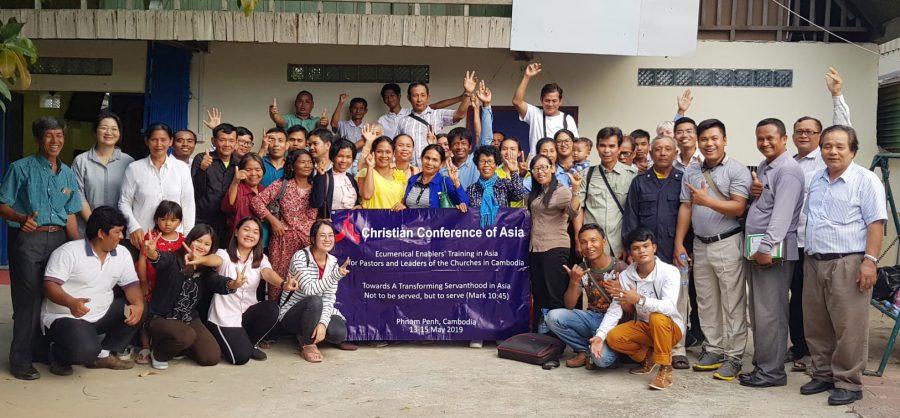Servanthood in accompaniment of people and churches in Cambodia should be an ecumenical priority

Participants of an ecumenical theological training for the pastors and church leaders from rural areas in Cambodia affirmed the servanthood while participating in God’s mission of accompaniment with the wounded and vulnerable people in Cambodia.
The training organized by the Christian Conference of Asia (CCA) in collaboration with the Kampuchea Christian Council (KCC) on the theme ‘Our Servanthood and Accompaniment with the People of Cambodia’ was held at the KCC headquarters in Phnom Penh from 13 to 15 May, 2019.
Forty-three participants from eight provinces of Cambodia such as Battambang, Banteaymeanchey, Kampong Spue, Kampot, Kandal, Phnom Penh, Siem Reap, and Svayrieng attended the training.
The participants recognized the increasing need for constant accompaniment with the people and churches in Cambodia, and they sought increased support of ecumenical accompaniment as a priority in future.
Various sessions in the training programme focused on themes and topics such as ‘Participating in God’s mission as servants’, ‘Emerging challenges and concerns in Cambodia and Christian response’, ‘Being the Church in solidarity with the broken communities in Cambodia’, ‘Building peaceful communities in Cambodia as God’s Mission’, and ‘Servanthood in God’s mission of healing the wounded and vulnerable people’.
“Churches in Cambodia have gone through a hard plight in the past and nowadays we witness enormous growth of the Christian community in Cambodia. However, it is also true that our churches are fragmented and divided. Lack of unity within the Christian community is a challenge we are facing in our churches”, stated Rev. Sok Nev, an ecumenically trained young theologian from Cambodia who provided leadership in coordinating the training programme.
“We have been taking for granted the supports from foreign missionaries in the last decades. Now it is time for us to equip our capacities to propagate the message of the Gospel by ourselves, and not be dependent on others”, added Rev. Chann Sok, pastor from a rural congregation in Siem Reap province.
Rev. Grace Moon, programme coordinator of CCA reminded the participants, “We know well what trials the churches in Cambodia had to undergo in the past. When you have long term war, isolation, poverty, trauma and marginalization, our Lord God also suffers with your people and hears your cries. Now, it is God’s call towards the churches in Cambodia to stand up together, hand in hand, to strengthen your ecumenical spirit of unity and to serve the people who are wounded and marginalized”.
“As we are God’s chosen people and called to serve the people, we are the agents of witnessing the Gospel, and transforming the wounded community to the fullness of life where peace with justice prevails” added Rev. Dr. Ngur Liana of CCA.
Rev. Dr. Chuleepun Srisoontorn in her presentations highlighted the importance of churches’ role to affirm the servanthood as caregivers and healers and to be in solidarity with the broken and divided communities.
Sem Srey Srose from Battambong, a representative of the young participants of the training remarked at the end of the session that, “Although we are the youngest among the participants, we think we are eligible to be part of this training since we are youth leaders and serve our churches as Sunday school teachers. I am very happy to attend this training especially to learn a new way of reading and interpreting the Bible in our local context”.
Together with a three member CCA staff team, the training was facilitated by Rev. Sok Nev, Rev. Thath Pheakdey, and Ms. Serey Vuthy Keo.
Cambodia suffered brutality under the Khmer Rouge led by Pol Pot in 1975 – 1979. During the four years of the Pol pot regime, Christianity was completely wiped out from the country and more than two million people were tortured to death; many of them were brutally murdered for their faith and beliefs.
The Cambodian churches, having survived against all these odds, were reopened and spread to all the provinces in the 1990s. However, till today mature leadership for the churches is the greatest challenge as Cambodian churches are deeply divided. Lack of leadership and theologically trained pastors warrants addressing the dire needs of proper leaders in local churches and congregations in the midst of the changing landscape of Christianity in Cambodia.
The World Council of Churches and the Christian Conference of Asia were the first ecumenical organizations that started working in Cambodia in the post Pol Pot era in the area of humanitarian assistance. Subsequently CCA has been accompanying the new Cambodian churches and the Christians in the country ever since Cambodia was opened after the U.N mediated peace process in the early 1990’s.
When Cambodia emerged as a new missionary battlefield in the early 1990s, CCA demonstrated its leadership in uniting the fragmented Christian groups in the country and assisted them to form a national ecumenical council, the Kampuchea Christian Council (KCC). The CCA has been assisting the Cambodian churches in bringing them to the mainstream of the Asian ecumenical movement, while being engaged in building capacities of local church leaders and nurturing their ecumenical leadership.
The Ecumenical Enablers’ Training in Cambodia, an initiative of CCA with the aim to serve the purpose of ecumenical theological training and leadership development of Christian leaders in the country, has been organized every year since 2015.










